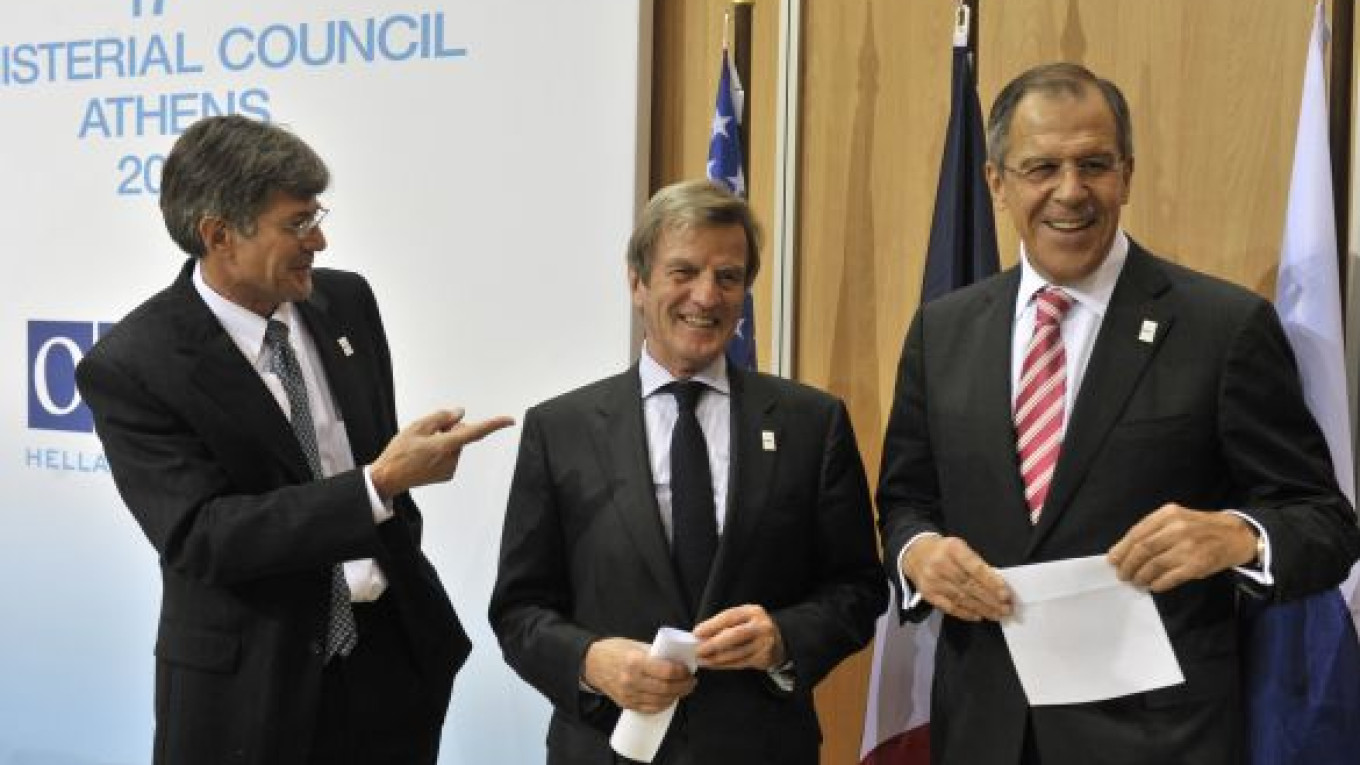ATHENS, Greece — Foreign policy chiefs from 56 countries said Tuesday that they hoped to reach a new security agreement that would cover much of the northern hemisphere but were lukewarm about a Russian proposal.
The United States said it was studying the Russian plan — changes billed by Moscow as a vital post-Cold War reform — but that it should not affect NATO.
The two-day meeting of the Organization for Security and Cooperation in Europe opened Tuesday amid efforts to reach OSCE’s first broad agreement on security since 2002, and Finnish Foreign Minister Alexander Stubb said there was slight progress.
Foreign Minister Sergei Lavrov promoted a set of security reform proposals sent to Western leaders over the weekend by President Dmitry Medvedev.
“There is a need to undertake decisive steps to overcome remaining dividing lines in the Euro-Atlantic region,” Lavrov said. “[It] seemed so achievable right after the fall of the Berlin Wall 20 years ago. We can only blame remaining prejudices and inertia for the fact that it has not been achieved.”
U.S. Secretary of State Hillary Rodham Clinton did not attend the talks in Greece, nor did the foreign ministers of Britain and Canada.
James Steinberg, a deputy U.S. secretary of state who did, gave a measured response to Medvedev’s letter and said Washington was studying the document. “Like other leaders, President [Barack] Obama received President Medvedev’s letter containing a draft European security treaty on Saturday,” Steinberg said. “We are studying this proposal carefully and we welcome the opportunity to continue dialogue that has been taking place within the OSCE.”
However, Steinberg said reforms should not affect the role of NATO — a common concern expressed by some alliance members when discussing security changes.
Stubb said the Russian proposal did not figure prominently in the talks.
“People didn’t really talk about the new Medvedev proposal that much because it has only been distributed to us over the weekend, so in that sense it’s too early to discuss the matter,” he said.
Stubb was also cautious on the need of a new European security framework.
“My take is that European security has been very well managed by three organizations over the past 60 years — the OSCE, the European Union and NATO — so one would have to prove the value added of new security structures on top of this,” he said.
OSCE countries have a wide range of security problems to contend with, including the situation in Afghanistan, Iraq, North Korea and Iran, and the aftermath of Russia’s war with Georgia last year.
“Security in our region remains a work in progress. The global crisis has affected all our countries,” said Greek Prime Minister George Papandreou, whose country holds the annual rotating chairmanship of OSCE.
However, Greek Deputy Foreign Minister Dimitris Droutsas said reaching a new security deal was “not very easy.”
Several foreign ministers held bilateral meetings on the sidelines of the conference, including talks between Lavrov and Israeli Foreign Minister Avigdor Lieberman. Israel wants Moscow to back more international sanctions against Tehran unless Iran adheres to restrictions set by the International Atomic Energy Agency.
Lieberman is to visit Moscow on Wednesday for an economic and trade meeting with Russia, the Israeli Foreign Ministry said.
Ukraine has started a program to safely dispose of about 16,000 tons of a highly toxic Soviet-era chemical used in rocket fuel, acting Ukrainian Defense Minister Valeriy Ivashchenko said Tuesday on the sidelines of the OSCE conference.
Ivashchenko said a first consignment of the liquid component, known as melange, was taken last month to Russia for recycling into chemicals for civilian use.
The disposal program, organized and mostly funded by the OSCE, will cost up to 14 million euros ($21 million) and should be completed by 2012, he said.
A Message from The Moscow Times:
Dear readers,
We are facing unprecedented challenges. Russia's Prosecutor General's Office has designated The Moscow Times as an "undesirable" organization, criminalizing our work and putting our staff at risk of prosecution. This follows our earlier unjust labeling as a "foreign agent."
These actions are direct attempts to silence independent journalism in Russia. The authorities claim our work "discredits the decisions of the Russian leadership." We see things differently: we strive to provide accurate, unbiased reporting on Russia.
We, the journalists of The Moscow Times, refuse to be silenced. But to continue our work, we need your help.
Your support, no matter how small, makes a world of difference. If you can, please support us monthly starting from just $2. It's quick to set up, and every contribution makes a significant impact.
By supporting The Moscow Times, you're defending open, independent journalism in the face of repression. Thank you for standing with us.
Remind me later.


